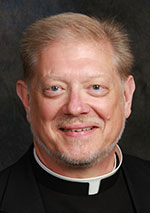That All May Be One / Fr. Rick Ginther
Virtual celebrations currently the norm for faith traditions
 The English word “church” is an Anglo-Saxon derivative of the German word “kirche,” which is itself derived from the Greek “kryiakon” (house of the Lord).
The English word “church” is an Anglo-Saxon derivative of the German word “kirche,” which is itself derived from the Greek “kryiakon” (house of the Lord).
The Spanish word “iglesia” is a Latin derived version of the Greek word “ecclesia.”
All refer to a place of gathering, usually a building.
Yet all find their ultimate root not in “building,” but in “assembly.” Thus we speak, as St. Paul did, of the “body,” the assembly of the faithful.
In doing so, we clearly acknowledge that our “religious gatherings” are primarily communitarian.
This is not to deny personal faith, personal prayer and personal relationship.
The “community of believers” sustains all religions. Individual belief finds sustenance there.
What a sadness that believers have suffered these past months from COVID-19. Great feasts—meals, remembrances, processions and great, crowded gatherings for prayer—were reduced to a domestic setting.
We Catholics, Orthodox and other Christians entered Holy Week separated one from another: no palm processions, no consecration of chrism oil, no foot washings, no Easter Vigil or choruses of Alleluia.
Yet we celebrated virtually each day in the hope we find in Christ’s life, death and resurrection.
Our Jewish brothers and sisters found themselves separated at Passover. Rabbi Dennis Sasso of Congregation Beth-el-Zedek in Indianapolis wrote:
“As we prepare to share the Festival of Passover this evening, we are conscious that our celebration will be different from previous years. We will be gathering in fewer numbers and with feelings of worry and anxiety. … Passover is the festival of hope. Our biblical ancestors experienced their first eve of Pesach sheltered in their homes, as the plagues raged… .” He concluded: “At the end of the Seder, let us say: ‘Next Year, TOGETHER.’ ”
For Muslims, deep in the midst of the Ramadan fast and anticipating Eid al Fitr (three-day end of fasting), all communal prayer has ceased, and any post-Ramadan feasting is solely familial.
The Fiqh Council of North America urged: “We hope and pray that Allah SWT [‘glory to him, the Exalted,’] brings relief sooner than later. … Taraweeh prayers [seeking pardon for sins] shall be performed at home within a family setting just like the regular daily Jama’ah. … The Council does not encourage virtual Taraweeh or Eid al Fitr prayers. … Virtual lectures, reflections … are encouraged.”
The Muslim Alliance of Indiana affirmed and extended this past Eid el Fitr. urging “the pause on all congregational services, including daily congregational prayers, Jumaa prayers, and Eid prayers.”
“Hindus have not been able to meet to celebrate some major holidays in our holy calendar,” writes Dr. Anita Joshi of Indianapolis. “These festivals are normally celebrated with large gatherings where we would share meals, hugs, and prayers. … [W]e now do this over our computer screens … gather[ing] virtually to support one another … to connect and reflect on the power of hope, compassion and love.”
In Thailand, Malaysia, Indonesia and the United States, Buddhists were counseled by their religious councils to celebrate at home. Livestreaming of ceremonies and online donations to Buddhist monasteries to light oil lamps for loved ones took place.
A university student in Jakarta, Indonesia, wrote in a post: “I feel like something is missing because we’re celebrating [at home]. … At first, it was so sad knowing that I couldn’t observe rituals and meet friends at the temple. The first puja bhakti [devotion] livestream also felt very different,” he said. “But as time goes by, I am getting used to it.”
Yes, people of varied faith traditions are getting used to it. We celebrate nonetheless, albeit in a muted, virtual fashion. And God is good.
(Father Rick Ginther is director of the archdiocesan Office of Ecumenism and Interreligious Affairs. He is also the pastor of Our Lady of Lourdes Parish, Indianapolis.) †
 The English word “church” is an Anglo-Saxon derivative of the German word “kirche,” which is itself derived from the Greek “kryiakon” (house of the Lord).
The English word “church” is an Anglo-Saxon derivative of the German word “kirche,” which is itself derived from the Greek “kryiakon” (house of the Lord).